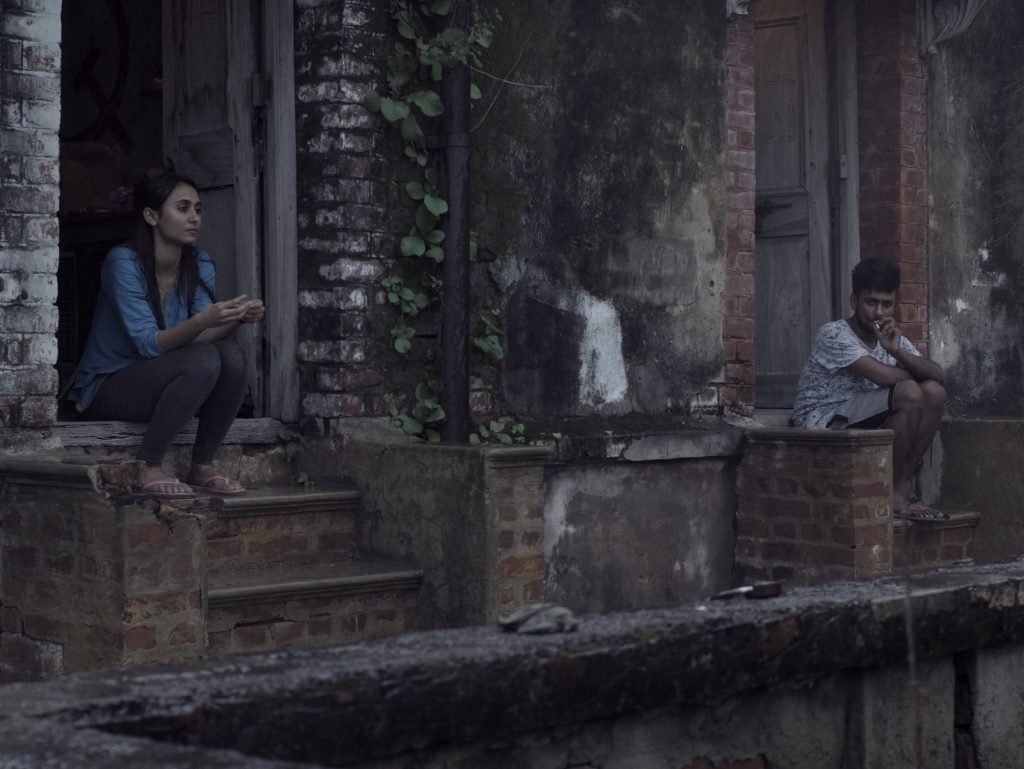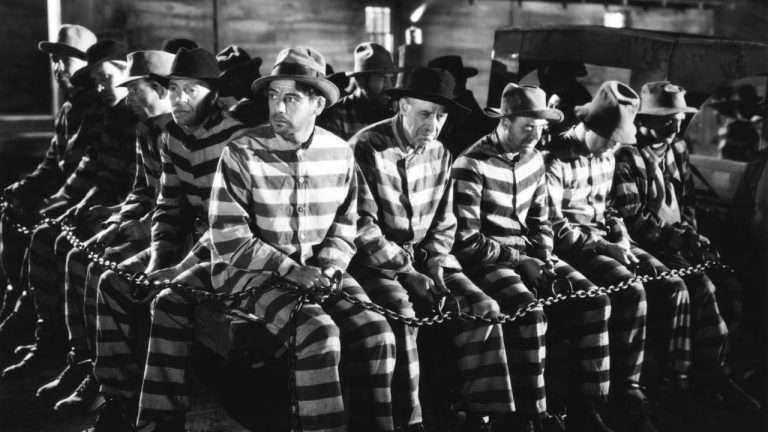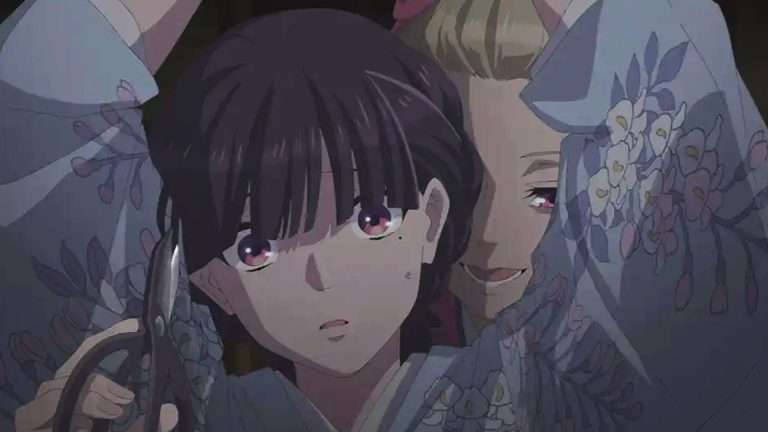The aftermath of a decision hangs over Pokhar Ke Dunu Paar. The momentous decision of a couple to elope from Darbhanga had already been made and enacted before the film’s events. We witness the fallout of that decision, both responding to the need for adjustment to reality in their frazzled ways. The results are fraught. They fled to Delhi to carve out a new life. Somehow, they scraped by until the pandemic struck, and the two returned to their hometown. It is where director Parth Saurabh chooses to begin his film and this sense of returning or coming from somewhere else, opting for one above the other at its own cost, wraps itself around the central characters, Sumit and Priyanka.
The return to Darbhanga invokes the impulse to reconnect with her father in Priyanka. This wishful desire is constantly battered by her father’s refusal to re-establish contact with her. All she wants is to go home and talk to him. Through a go-between, he informs her she’s welcome home only if she leaves Sumit. Sumit projects himself as ostensibly looking for a job in Darbhanga; however, the grind of seeking is strenuous, and he’s only glad and eager to slip back into the hood of his old friends who ply him with goodwill and favors to get by on. The reassurance he feels in their company, shielding him from the direness of his pursuits of better prospects, is unavailable to Priyanka. She craves home to prop her up against the uncertainties she finds herself amidst.
Sumit and Priyanka take up lodging in the CPI(M) Party’s boys’ hostel. The film quickly builds an acute awareness of space and its lack thereof. The roof has several leakages, and the corners of the room are crammed with canisters and leftover wares. Saurabh creates a portrait, affecting and subdued by turns, of two individuals who are as interested in their frustrations and disappointments regarding one another as it is in the interlocking economic and gendered anxieties undergirding the relationship.
Pokhar Ke Dunu Paar is driven by conversations between friends, lovers, and dreamt-of ones between parent and child. The lattermost can only claim a tertiary scope in Priyanka’s dream sequences, a muted hope shortchanged by the waking moment. The lover’s hovering presence disrupts and impedes any possible exchange between Priyanka and her father. Sumit’s banter with his friends, his reverting to an over-familiar vexing behavioral pattern, is recognized by her as something that, in its retired complacency, will not strive for better.
There’s a keen reframing of the past, primarily through a conversation between Priyanka and her visiting friend. As both discuss their past and present, how things came to pass and where they feel they are with their lives, there’s a noticeable sharpening of the emotional distance that’s grown palpably between the friends. One judges the other brusquely for the situation she’s put herself in once she’s admonished with cutting clarity the impasse she’s in. Tanaya Khan Jha and a striking Nikita Gupta navigate the scene with restraint and maturity. It also clarifies the gendered ecosystem within which Priyanka finds herself perturbed due to her desires being quashed to make way for the status quo of the male earning obligation. As she rails against her friend’s constricted situation at home with her husband, we can detect a strong apprehension about her dilemma.
In one sequence, we watch Priyanka walk past a pond whose edges are limmed with debris. The local college towers in the background. A party leader’s speeches about the state’s joblessness and outward migrations are ironically positioned against characters shooting the breeze. Saurabh plants all these not as cues but as thick patinas that surround and envelop the principal pair while arranging their understanding of the relationship and future course of action into manageable proportions. Priyanka has a vigorous, restless ambition that is reluctant to be crunched under her circumstance even though it seems increasingly, overwhelmingly prone to pinning her down. Her clashes with Sumit are over mundane matters such as household necessities, but they stem from her growing alarmed realization of the life she’d conceived as effectively tapering off. She seems haunted and encumbered by her decision to be with him as his inclinations start wearing her out.
Tanaya Khan Jha brilliantly channels not only the impatience and exasperation but also the chafing against the overbearing resignation that threatens to overtake Priyanka. She combines a sturdiness with an evocation of anchorage melting away. In a film where the central pair’s dynamics are crucial to the subtle thematic unraveling, Tanaya Khan and Abhinav Jha work off each other beautifully. Both are wonderfully transparent actors; the pangs of desperation, anguish at a partner’s tired habits, and inadvertent stubbornness feel immediate and rich with an inner turmoil that is intelligently mapped out throughout the film.
Abhinav Jha refracts his charming guilelessness from his presence in Achal Mishra‘s moving Dhuin into Sumit here; while we may be as peeved as Priyanka is with his inveterate ways, we are never misaligned with the force of his intentions. That he’s trying his best comes through most gently in Jha’s performance. The arguments between the lovers are peppered with endearing bits. Sumit tearfully telling Priyanka he brought chaat for her after she rebukes him for yet again shirking what she keeps nudging him makes for the most incredibly tender moment, Jha carrying a loving, sweet sincerity in the scene.
Jha has this ease about him which Saurabh luxuriously expands on in a long, freewheeling scene of Sumit with his friends. Like many others in the film, this scene flows with uncomplicated, improvisational energy, and the actors playfully attuned to each passing beat of the moment as the scene glides from an amped-up masculine teasing to the most delicately judged shared sense of vulnerability. Saurabh deftly orchestrates this shift in mood, his editing a perfect balance of the light-footed and the soberly sensitive. Watch out for Jha when Sumit says, spirit sagged, things didn’t pan out as they had imagined it’d. His interactions with Nihal (Dheeraj Kumar brilliantly conveys their shared history with so little) constitute some of the film’s standout scenes, filled with truth and honesty right to its bones.
In its final stretches, Pokhar Ke Dunu Paar lyrically, hauntingly moves in directions that confound the definitive and conclusive, mangling sense of time, conjuring a vivid fluidity of place, situation, episode, and eventuality itself. Characters drifting become locked into perennial segues, arriving nowhere with any finality. The love story is redrawn with high atmospherics. The soft plangent strains of the narrative build towards a disquiet, the sleepy, rainy tenor of afternoons (DoP Pradeep Vignavelu achieving the most enchanting rhythms of the film, aided by Yash Sahai’s music ) slide into something that’s a simultaneously diffuse and crushingly authentic insight into a relationship hard-pressed by all that it must negotiate and endure.
Saurabh mines tension from the tussle between Sumit’s lax inaction and Priyanka’s quest for a more willed guiding of her life with him. She yearns for him to take charge; he keeps skidding off into a persistent torpor. Saurabh cultivates a deeply sympathetic gaze for his characters, drawing us into a state where we can engage emotionally with what propels and alternately sideline them into stasis. This yields a wise and intuitive film to brittle psychological questioning while being enormously accustomed to economic determinants, the inescapable reality constantly jostling to assert itself amidst interpersonal connections.
Pokhar Ke Dunu Paar screened at the Dharamshala International Film Festival 2022
Pokhar Ke Dunu Paar Movie Clip:
https://www.youtube.com/watch?v=ppYUIClJPow





![Oslo, August 31st [2011] Review – A Deeply Sympathetic Character Study of a Former Drug Addict](https://79468c92.delivery.rocketcdn.me/wp-content/uploads/2020/11/oslo-august-31st-768x432.jpg)
![Eighth Grade [2018] – A Captivating and Heartfelt Portrait of Modern Teenage Life](https://79468c92.delivery.rocketcdn.me/wp-content/uploads/2018/09/Eight-Grade-2018-768x432.jpg)


